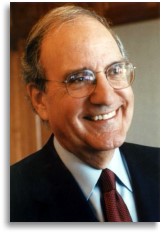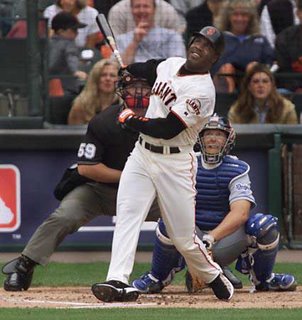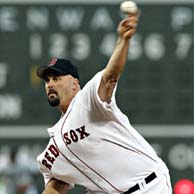 An ESPN News anchor quoted a report in the Chicago Tribune that Major League Baseball was considering a suspension for Barry Bonds. They claim their information came from this Selig press conference. Obviously, they're either lying or can't read. Look at it for yourself.
An ESPN News anchor quoted a report in the Chicago Tribune that Major League Baseball was considering a suspension for Barry Bonds. They claim their information came from this Selig press conference. Obviously, they're either lying or can't read. Look at it for yourself. COMMISSIONER BUD SELIG: Chuck Armstrong, the President of the Mariners walked in. I told him to get out of the line of fire. I didn't want him to get hit. Good afternoon. I guess I'll preempt all the questions you want to ask on the story of the last 24 hours. I will review all the material that's relative in every way. And obviously, we've only seen parts of things. And the book itself doesn't come out until the end of the month, but we'll review everything that there is to look at. And at some appropriate time, I'll have further comment. But I don't have any further comment at this point. So we'll talk about all the other subjects you'd like to talk about today. I'll be very happy to do so.
Q: Barry Bloom from MLB.com.
COMMISSIONER: Believe me, an introduction is not necessary. (Laughter) But thank you for asking.
Q. Are we talking about an investigation or are we just talking about --
COMMISSIONER: I just said I would review all of the information. I was very careful, Barry, to say exactly what I said, and that's exactly what I mean. Ken?
Q. Bud, they want us to introduce ourselves is the only reason --
COMMISSIONER: No, I understand. He follows me around. I really -- I hate to say this to you, but my wife might get concerned after a while. All right, Ken. Go ahead.
Q. You spend more time with me than her.
COMMISSIONER: That's true.
Q. Bob Dupuy was quoted by Bloomberg News as saying you were going to meet with Barry Bonds at some point; is that accurate?
COMMISSIONER: I don't have any plans to do that now, Ken. But I just -- I meant what I said, you know. This story, in the form it has, just happened, and so I want to be very careful here as to how I respond. I know Bob said that, and I'm not saying it will or won't happen. But I don't have any plans at this moment.
Q. You seem to make news every time you come out here. When we were up at --
COMMISSIONER: Believe me, I -- today if I had my choice, I would have gone to have a root canal job. (Laughter.)
Q. On that line, when we were talking about the initial steroid developments at the Honors meeting, you made the comment that this period of time we've talked about may be called the steroid era, like the dead ball era. Is that something that you think is a genuine concern when people look back at what happened over the last 10 years?
COMMISSIONER: Let me try to review. I've spent a lot of time thinking about this, not only in the last 48 hours, but come on. For whatever one wants to say, from 1998 on, we've come, as a sport, a long way. We have a minor league program that's entered it's sixth year, I believe. We got drug testing for the first time in our history. At other times, as I said, back in the '80s, when there was a very significant problem, cocaine problem, couldn't get any testing. People have been critical of the plan, but it led -- the first plan we got led to a second plan, which the Players Association agreed to to their everlasting credit, agreed to it and didn't have to. And then, of course, last year from March 17th on to where we are today, I believe we have the toughest testing program in American sports. I can only deal with the present and the future. There's a lot of people who already have significantly different observations about what's happened, even the latest things. And, you know, I have to -- I'll have to let nature takes its course in that regard. I said a year or two ago, and I'll say again here today, I can only do what's in the present and the future's best term interest for our sport. Nobody can turn the clock back. And I have said publicly many times, and I'll say it again, that for the most part, our players did not engage in steroid use. We have allowed a fair amount of test results that show that, even the first test result. So I think it's unfair to stigmatize, if you will, if that's the word, everybody with that kind of usage.
Q.You've addressed this in the past, but would you do it one more time. Give your view on the idea that a lot have people suggested you should do something about Bonds' records or the records of any other players who have -- who are suspected or have used performance-enhancing substances.
COMMISSIONER: I will. I'm sensitive about that because, look, I've had people say, you know, if Judge Landis were still alive, this is what he would do. Well, the fact of the matter is that for the most part, I'm very careful what I say here, so please listen, we have no empirical data before 2003. I've heard a lot of people make observations. I think, Marie, I've even used the term McCarthyism in some great regard about people who without much evidence other than what they believe is anecdotal evidence say, well, this person did it or that person did it. And I'm going to be very sensitive about all that because after all, you're playing with people's lives and their reputations, and you ought to be very careful. All of us ought to be careful. The commissioner certainly is going to be careful. It doesn't mean I don't have interest. I've spent more time talking, as I've told all of you, to doctors, trainers, players from different generations. I've had a lot of conversations with a lot of people, more than anybody will ever know. So for anybody to suggest that I haven't taken this seriously is not only wrong, but is making another observation, which is both unfortunate and unfair. And when I look back on the '90s, maybe even the '80s, I've talked to a lot of players including a significant number of players that played for me. Nobody commented to me at the time. A lot of general managers who I have enormous regard for are insulted when people say they knew, they turned a blind eye, this is a great thing for baseball, they made a lot of money, all of which is just sheer nonsense. But I know it makes good reading, so that's okay -- or good listening. So, it isn't a question that we are not sensitive to these concerns. I think we have done everything we could and what's evolved has been I think fair. I said to all of you, some of you disagreed, and I understood that, too, that a year ago, I told you it was an integrity issue for me. That's why we needed a tougher program. I think history has borne me out to be absolutely right, by the way, but if you'll permit me one pat on the back today because that's the only one I'll get all day from anybody. But I am proud of that fact, and of all the parties involved, the Players Association, the clubs, everybody has I think really worked hard at this and there is no lack of concern or sensitivity anywhere. A lot of things in life, you know, you wish didn't happen, but they do. I guess that's as they remind me almost on a daily basis that's why you have a commissioner. As if I needed reminding, by the way.
Q. Bud, you said you would review the material, but with what's just come out so far with the excerpts, what's been said in the last 48 hours, would you comment on the damage it's done to the game again and whether you're disturbed about the excerpts you've heard and also the timing with the World Baseball Classic?
COMMISSIONER: Look, I'm not going to comment any further because I'm in a position I think all of you understand as a commissioner that, you know, comment from me at this very, very preliminary time is just inappropriate. And I want to be very careful about that, Tom. And yesterday, as I was watching the Venezuela/Dominican game, I was just enthralled by what I was seeing, and I should have learned 40 years ago, and I do this all the time, I said what a great day this is going to be just watching. (Laughter.) That was at 12:01.
Q. Could I ask you, you said whatever you're going to call it, examination, review, investigation, whatever, can you tell us why it's important for the commissioner of baseball to do this?
COMMISSIONER: Well, because I feel that it is. And I think that given everything that's come out, I can't sit here and tell you today, well, that's fine. This is interesting. I believe, as I would do on every subject, that I felt in any way it involves the game, reflects the game, I would do this and that's what I'm doing.
Q. Will that necessarily -- I know you were asked that before. Wouldn't it necessarily involve at least some contact with Barry Bonds?
COMMISSIONER: You know, that's a judgment that I haven't made yet at this point in time.
Q. Do you like the World Classic a little better today than you did a week ago?
COMMISSIONER: I like it a lot better than the other stuff we've been talking about.
Q. How concerned are you personally about the idea regardless of who it might be, the idea of someone holding the most revered records in the sport eventually, by whatever means, being proven a cheater? How much of that, as all this steroid stuff has been unfolding in the past year or so, how much has that been a concern of yours?
COMMISSIONER: I'm not going to comment on that, Dan. You know, until all the evidence is in and until I've heard and conducted what I said I was going to do, I think it's inappropriate for me to comment, and I won't comment on it.
Q. Bud, working on that a little bit, regardless of what happens over the next month or so, how will you view Bonds this summer as he sort of steps towards these things? How will you be watching? What will your emotions be?
COMMISSIONER: You know, again, until all the facts are known, Tim, until I've really been thorough and looked at everything -- after all, he's denied, continues to deny. And so, therefore, you know, I really believe it's inappropriate for me to comment on any of that in any way, shape, form, or manner. I understand the concern of trying to pass judgment and I understand that, but I just, I'm not going to do that until we know everything there is to know. And I don't think anybody today can say that they know that, and that's why I think my comment is appropriate.
Q. Bud, Pete Rose did deny -- Pete Rose was investigated. What is the difference? Why did MLB investigate Rose and why hasn't MLB investigated Bonds? In previous years, you've said there hasn't been enough evidence on Bonds, two years ago, one year ago, most recently this spring.
COMMISSIONER: I don't want to get back into the Pete Rose thing, but there was enormous evidence that Peter Ueberroth and Bart Giammati had, John, right from the beginning. That's what prompted them to do what they did.
Q. Is there more evidence today than there was the last time you said there's not enough evidence on Barry Bonds?
COMMISSIONER: Again, I'm not in a position to make that judgment.
Q. Lastly, what will MLB do to acknowledge Bonds passing Ruth, if he does it, it could happen next month?
COMMISSIONER: Everybody's asked that before, and we'll decide that when things move forward.
Q. Bud, have you had any communication in the last 24 or 48 hours from Washington from Congress regarding the possibility of reopening the investigation that they held, and do you anticipate another trip to Capitol Hill?
COMMISSIONER: I've had no communication. I've talked to some people in Washington today who seem to be more concerned with other things frankly. But look, Tim, we went to Washington, passed the toughest steroid bill in sports, took care of amphetamines. After all, amphetamines have been around for seven decades or longer. I don't know what they called them way back then. So I think that everybody in Washington, and they've all told me this, I don't think -- we did what we had to do. Now, I was very careful what I said on what we're going to do, and I don't think anybody in Washington would disagree with this stance. The answer is I've heard from nobody.
Q. Bud, as somebody's been in this business for a long time, we journalists look at what these two respected journalists have done and the length of work and the evidence they've pointed to in terms of sources and carefully sourcing everything they did. And to some of us, it may seem -- I'm right here -- you're giving kind of a skate to that and treating this like any other book that's come out, but this is an exhaustive piece of research. It's obvious. Are you planning to, A, get an advanced copy of the book, B, talk to the people who wrote it and what they came to? And don't you give this book a little more weighty evidence than just something that flies out on paperback at some point?
COMMISSIONER: Well, I didn't infer that at all. I said we would review the entire situation. I meant review the entire situation. The book's not out yet, and certainly I'm sure that all of us will read the book.
Q. Who is your point person on the review and does Bonds remain on the active roster during the review?
COMMISSIONER: Well, the point person will be people in our office, Jerry. I've talked to obviously Bob Dupuy and John McHale and Rob Manfred, Jimmy Lee Solomon. There will be a lot of people as they do on most subjects.
Q. Does he remain on the roster (inaudible)?
COMMISSIONER: Certainly does.
Q. What are you able -- as commissioner, what power do you have to do something if you find certain -- make certain findings in your examination?
COMMISSIONER: Determine that at the appropriate time. Of all the concerns I have today, that's the least concern.
Q. Can you explain, as commissioner, do you have a total power? I've never understood exactly what power the commissioner has.
COMMISSIONER: Neither do a lot of other people. (Laughter.)
THE MODERATOR: Just a couple more questions.
Q. What have you seen David Wells' comments?
COMMISSIONER: I have.
Q. What's your reaction?
COMMISSIONER: I have no reaction.
Q. No comment?
COMMISSIONER: None.
Q. Are you going to --
COMMISSIONER: I have no reaction, Barry.
THE MODERATOR: Any others? All right. Thank you.












